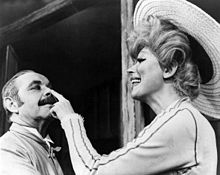David Burns (actor)
David Burns | |
|---|---|
 | |
| Born | June 22, 1902 Manhattan, New York City |
| Died | March 12, 1971 (aged 68) Philadelphia, Pennsylvania, U.S. |
| Occupation | Actor |
| Years active | 1918–1971 |
David Burns (June 22, 1902 – March 12, 1971) was an American Broadway theatre and motion picture actor and singer.[1][2]
Life and career
Burns was born on Mott Street in Chinatown, Manhattan, the son of Harry and Dora Burns of Brooklyn.[3]
He made his Broadway debut in 1921 in Polly Preferred and went to London with the show in 1924.[4] His first musical was Face the Music in 1932,[5] and Cole Porter's Nymph Errant (1933) was his London debut.[6] He appeared in many comedies and musicals over an almost 50-year career.[7]
He won two Tony Awards for Best Featured Actor in a Musical, for his performances as "Mayor Shinn" in The Music Man (1958) and as "Senex" in A Funny Thing Happened on the Way to the Forum (1963).[8][7]
Burns introduced the hit song "It Takes a Woman" from Hello, Dolly (1964) as the original "Horace Vandergelder".[9][10]
Burns won a Primetime Emmy Award for Outstanding Supporting Actor – Drama Series for his role of Mr. Solomon in the 1971 TV special (Hallmark Hall of Fame) The Price by Arthur Miller.[11]
Death
Burns died on stage on March 12, 1971, of a heart attack in Philadelphia during the out-of-town tryout of Kander and Ebb's musical 70, Girls, 70.[3]
Selected credits
|
|
|
Awards and nominations
| Year | Award | Category | Work | Result |
|---|---|---|---|---|
| 1958 | Tony Award | Best Performance by a Featured Actor in a Musical | The Music Man[7] | Won |
| 1963 | A Funny Thing Happened on the Way to the Forum[7] | Won | ||
| 1966 | Primetime Emmy Award | Outstanding Supporting Actor in a Drama Series | The Trials of O'Brien[11] | Nominated |
| 1971 | Hallmark Hall of Fame | Won | ||
| Tony Award | Best Performance by a Leading Actor in a Musical | Lovely Ladies, Kind Gentlemen[7] | Nominated |
Further reading
- Oderman, Stuart, Talking to the Piano Player 2. BearManor Media, 2009. ISBN 1-59393-320-7.
References
- ^ Sandra Brennan. "David Burns – Biography, Movie Highlights and Photos – AllMovie". AllMovie.
- ^ "David Burns". BFI.
- ^ a b "David Burns, 69, Star In Musicals" The New York Times, March 13, 1971.
- ^ The Broadway League. "David Burns – IBDB: The official source for Broadway Information".
- ^ Face the Music ibdb.com. Retrieved October 12, 2017
- ^ Nymph Errant sondheimguide.com. Retrieved October 12, 2017
- ^ a b c d e f "David Burns Broadway" Playbill. Retrieved October 12, 2017.
- ^ "Search Past Tony Award Winners and Nominees – TonyAwards.com – The American Theatre Wing's Tony Awards – Official Website by IBM". TonyAwards.com. Archived from the original on August 31, 2016. Retrieved April 28, 2016.
- ^ The Broadway League. "Hello, Dolly! – IBDB: The official source for Broadway Information".
- ^ Hello, Dolly! Playbill. Retrieved October 12, 2017.
- ^ a b "David Burns Emmy" emmys.com. Retrieved October 14, 2017
- ^ Barnes, Clive. "Theater: Art Buchwald's 'Sheep on the Runway' " The New York Times, February 2, 1970
- ^ "David Burns Films" tcm.com. Retrieved October 12, 2017
External links
- 1902 births
- 1971 deaths
- 20th-century American male actors
- American expatriate male actors in the United Kingdom
- American male film actors
- American male musical theatre actors
- American male stage actors
- Deaths onstage
- Male actors from New York City
- Outstanding Performance by a Supporting Actor in a Drama Series Primetime Emmy Award winners
- People from Chinatown, Manhattan
- Tony Award winners
